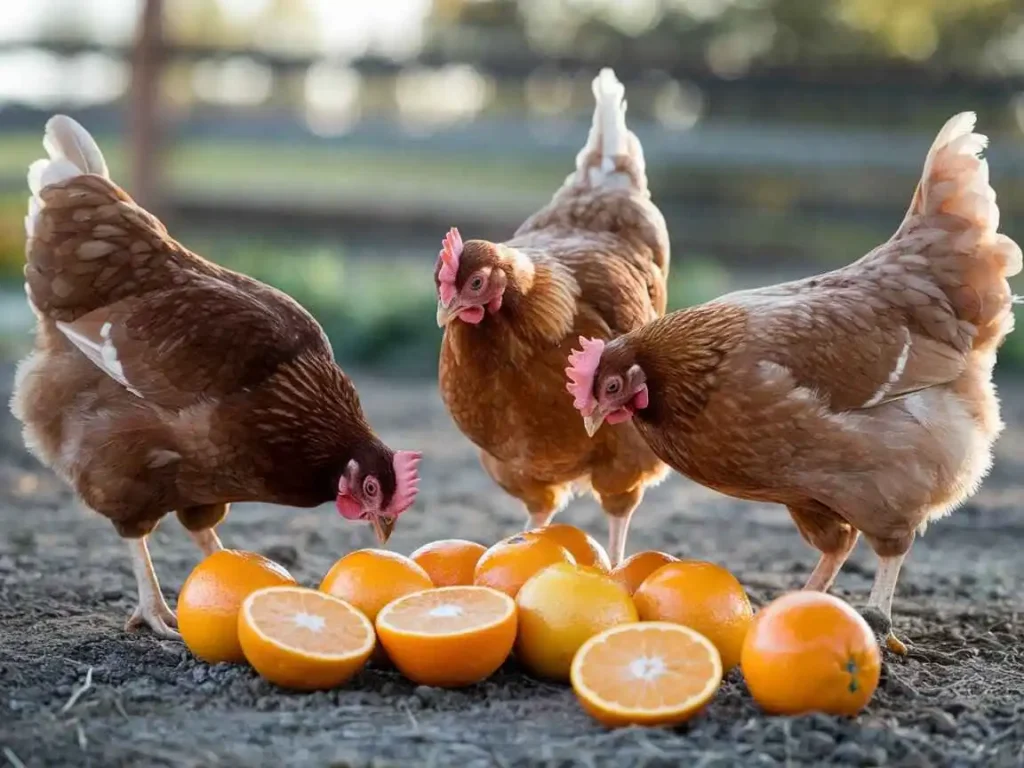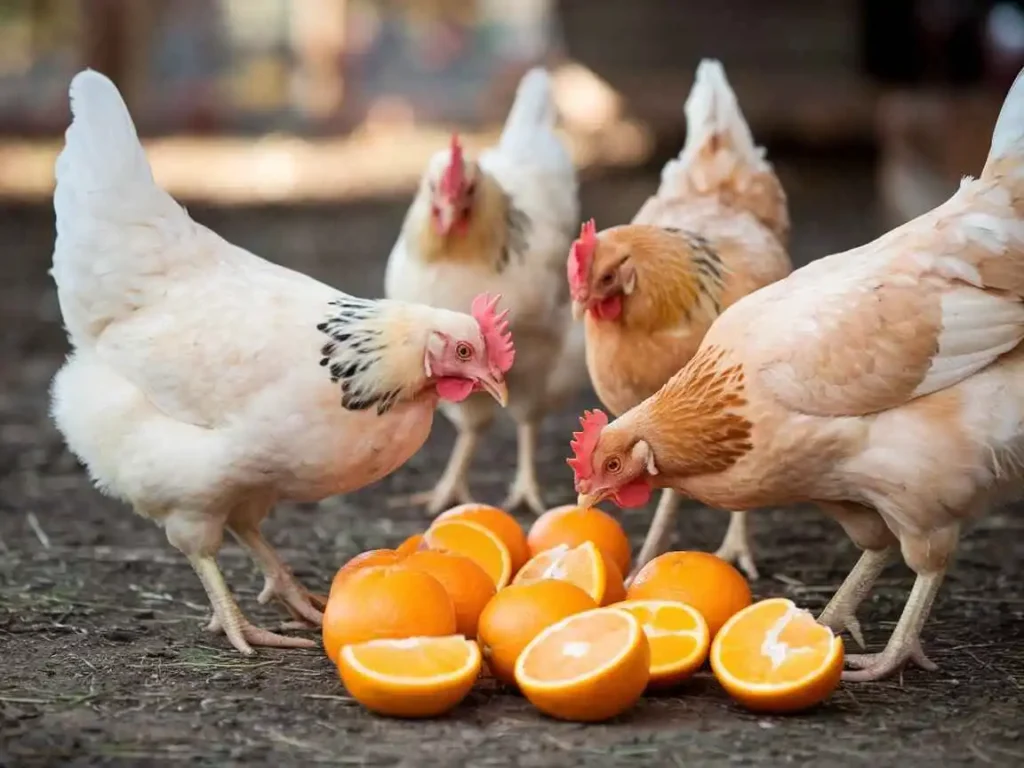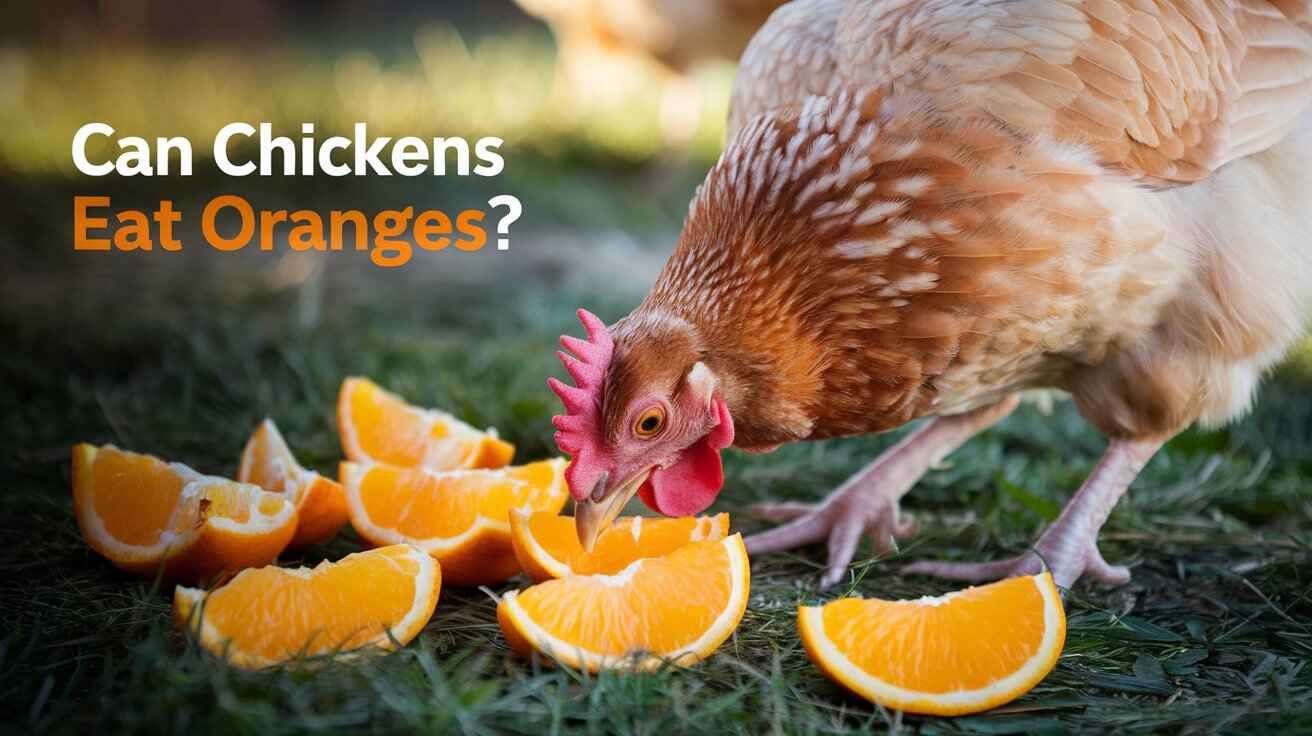Chickens are fascinating creatures, and feeding them can be quite entertaining, especially when you introduce something new to their diet. My own flock once created pure chaos over a mix of scraps and goodies.
It’s essential, though, to make informed decisions about what you feed your hens. While they enjoy a variety of food, their needs are more complex than just tossing in table scraps.
The nutritional balance of a chicken’s diet is ever-evolving, influenced by human domestication and sustainable chicken-keeping practices. Whether it’s grains, vegetables, or even unusual treats like citrus, feeding choices impact their health.
Take oranges, for example. Their orange peel might seem like a fun snack, but not all birds find it appealing. Some hens might poke at it, others may just walk away. However, providing them with food groups like fruits in moderation can help maintain a balanced diet.
From my experience, a little experimentation with safe foods—including bananas or even celery—keeps the feeding routine lively. Of course, don’t forget precautions like avoiding spoiled scraps or harmful items like styrofoam to ensure your coop remains healthy and thriving.

Table of Contents
ToggleCan Chickens Eat Oranges?
While some might assume that chickens can enjoy anything edible, the reality is more nuanced when it comes to oranges. These fruits are safe for chickens in moderation, offering a good source of vitamin C, folate, potassium, and magnesium.
Studies like the one by Abd El Latif et al. highlight how orange peel meal, a byproduct of orange juice production, can improve growth performance and feed efficiency in broiler chickens.
However, the inclusion of oranges or their peel in their diet should be balanced with other nutrient-rich foods to avoid health issues such as overfeeding or disrupting their nutritional benefits.
From my experience as a chicken fancier, introducing oranges to a flock can lead to mixed reactions. Some birds may curiously eat a slice, while others might steer clear altogether.
Overdoing it with excessive amounts of citrus could lead to undesirable behaviors like pulling feathers or laying thin-shelled eggs. Though rare, these outcomes remind us to follow the rule of variety and a well-rounded diet to ensure optimal health and growth for our feathered friends.
Nutritional Benefits of Oranges for Chickens
Oranges are a great way to provide additional benefits to your flock, especially during times of stress or illness. Rich in key nutrients, they can positively impact chicken health when offered in moderation.
For instance, folate supports blood formation, healthy feathers, and proper size. Magnesium aids in bone strength, muscle function, and cellular metabolism, while potassium helps with electrolyte regulation, hydration, and heart health.
Even though chickens naturally synthesize vitamin C, supplementing their diet with this essential nutrient can boost immune function, aid collagen production, and improve their overall health. Lastly, the antioxidants in oranges can combat oxidative stress and offer long-term support for your flock’s well-being.
How Does Orange Affect Chickens?
Oranges can positively impact chickens when fed in the right quantity. They are rich in antioxidants that help reduce oxidative stress, which can lead to improved overall chicken health.
Adding oranges to a balanced diet can also enhance digestive health, improving nutrient digestibility and helping chickens gain weight more efficiently, boosting growth performance and feed conversion ratio.
However, moderation is key, as overfeeding can lead to excess abdominal fat, so it’s important for poultry owners to know how much to feed and balance it with other foods for the best results.

What About the Peels?
Chickens generally avoid orange peels as they seem to hate the texture and flavor. I once gave my chickens an orange peel, and instead of eating it, they kicked it around the yard until it became a hardened orange ball.
Some people believe the acidity in oranges can upset the natural bacteria in a chicken’s digestive system, particularly in the crop, making them bad for chickens. On the other hand, others argue that the orange acid can help kill bad bacteria.
While these two schools of thought sit on opposite ends of the spectrum, it’s worth noting that the difference between good and bad bacteria may not matter to a chicken’s system, so proceed with care when offering pulp or peels.
Proper Serving Size and Frequency for Feeding Oranges to Chickens
When feeding chickens oranges, it’s important to keep the serving size in check. You can offer half a slice to 1 slice per chicken due to the sugar content. Limit their intake to 1 to 3 times a week to prevent overfeeding and avoid any potential digestive issues.
While oranges offer benefits, including essential nutrients, they shouldn’t be the main source of food. It’s essential to balance their diet with other nutrients from grains, vegetables, and other fruits.
Mixing orange peel meal or chopped oranges with their regular feed helps to maintain a balanced diet, ensuring chickens receive all the necessary nutrients without the risk of overconsumption or imbalanced nutrition.
Potential Risks of Overfeeding Oranges to Chickens
Oranges can be a nice treat for chickens, but it’s important to feed them in moderation. Overfeeding can lead to high sugar intake, which puts stress on their digestive systems and causes health issues.
Chickens are not equipped to handle large amounts of sugar, which can lead to problems like stomach discomfort and diarrhea. The acidity in oranges can also irritate their digestive tract, causing further issues like gastrointestinal problems and even ulcers.
It’s essential to maintain a balanced diet for your flock, ensuring they get proper nutrient absorption from grains, vegetables, and proteins. Relying too much on oranges can result in a dietary imbalance, leading to nutritional deficiencies and a drop in productivity.
So, while they enjoy oranges, stick to the recommended serving sizes and feed them no more than 1 to 3 times a week to keep them healthy and happy.

How to Feed Oranges to Chickens
When feeding oranges to your chickens, it’s important to do so in moderation. Start with small doses like wedges or cut pieces, as offering a whole orange or citrusy orb can cause confusion for the flock.
You can combine oranges with their regular meals but always monitor how much they consume. Too many can turn off your chickens from their feed altogether. Always ensure that the oranges are fresh, organic, and free from pesticide residue and wax.
Store any leftover oranges in a secure location to prevent pests and spoilage. Remember, feeding oranges too frequently or in large quantities can cause overfeeding and lead to health issues like illness.
Finally, make sure to provide enough feed packs to prevent bullying and ensure uniform distribution of food to all your chickens as they peck around the coop or while strolling.
Wrapping It Up!
Oranges can be a valuable treat for chickens when fed in moderation, offering them essential nutrients that support their health. However, they should not replace other nutrient-rich foods in the chicken’s diet. High-fructose fruits like oranges should be incorporated carefully into a balanced diet to ensure their well-being.
Following guidelines and ensuring optimal consumption will allow chickens to benefit from oranges without compromising their overall health. By doing so, you can keep your chickens happy and thriving while enjoying the benefits of these fruits.




